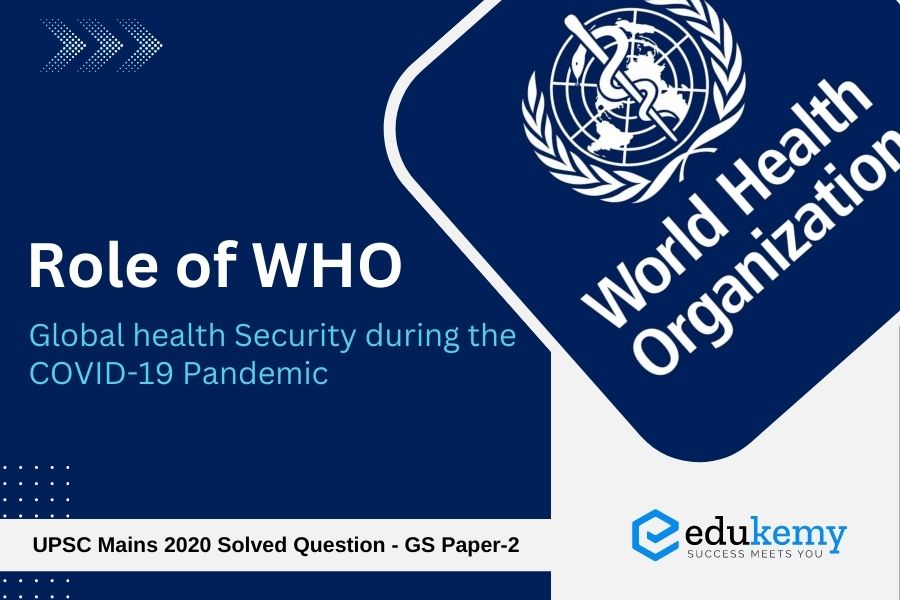The World Health Organization (WHO) played a pivotal yet controversial role in addressing global health security during the COVID-19 pandemic. On one hand, the WHO served as a central coordinating body, disseminating information, offering technical guidance, and fostering international collaboration. Its efforts in mobilizing resources, distributing medical supplies, and facilitating research initiatives were commendable. However, the organization faced criticism for its initial response, characterized by a perceived delay in declaring a Public Health Emergency of International Concern (PHEIC) and potential early complacency in acknowledging the virus’s human-to-human transmission. Additionally, concerns were raised about the WHO’s dependence on member states for timely and accurate information, which may have contributed to a lack of transparency in the early stages of the pandemic. The pandemic exposed weaknesses in the global health governance system, prompting a reevaluation of the WHO’s structure and funding mechanisms to enhance its capacity to respond swiftly and effectively to future health crises. Overall, a critical examination of the WHO’s role in the COVID-19 pandemic underscores the need for continuous improvement and reform in global health governance to better safeguard global health security.
UPSC Mains General Studies Paper – 2 Mains 2020
Important International institutions, agencies, and fora – their structure, mandate
UPSC Mains Civil Services IAS Exam Question Paper – 2020
Contents
- 1 Structure of the Question
- 2 Answer
- 3 Conclusion
- 4 Frequently Asked Questions (FAQs)
- 4.1 1. What is the role of the World Health Organization (WHO) in global health security during the COVID-19 pandemic?
- 4.2 2. How does the WHO contribute to the early detection and response to outbreaks like COVID-19?
- 4.3 3. How does the WHO coordinate international collaboration in the face of a global health crisis?
- 4.4 4. What challenges has the WHO faced in fulfilling its role during the COVID-19 pandemic?
- 4.5 5. How does the WHO contribute to building long-term global health resilience beyond immediate crisis response?
Structure of the Question
- In Introduction,
- Role and responsibility of WHO.
- In Body,
- Response of WHO during the COVID-19 pandemic and performance issues.
- Importance of WHO as an organization.
- In Conclusion,
- Performance of WHO in handling similar situations in the past and measures to empower its organization and functioning.
Answer
Introduction
The World Health Organization (WHO) defines Global public health security as “the activities required to minimize the danger and impact of acute public health events that endanger the collective health of populations living across geographical regions and international boundaries.”COVID-19 is characterized as a virus-induced pandemic which refers to a new disease to which people do not have immunity. The WHO issued guidelines and practices to be followed by the people to prevent the spread of the COVID-19 virus.
WHO during Covid-19 pandemic
Carelessness on the part of the WHO
The WHO has been accused of mismanaging the Covid-19 crisis and failing to vet information and share it in a timely and transparent manner. It delayed declaring COVID-19 a pandemic, which resulted in late actions by countries, aggravating the situations around the world.
Influence of China on the functioning of the organization
WHO was also criticized for its handling of China, where the virus had originated. There was a deliberate delay in releasing virus-related information. On the one hand, the WHO was accused of dancing to China’s tunes and, on the other, there were serious questions on the powers that the WHO enjoys when it comes to taking strict action against deep funders like China. The World Health Organization (WHO) has been alleged as “very China-centric”, for its negligence to cover up China’s failure to handle the crisis.
Funding of WHO
Today’s global institutions are extremely dependent on their contributors for funding, and they often become pawns for their political agendas. Regarding contributions, the withdrawal of the USA resulted in inadequate funds and manpower which further curbed the WHO’s independence and its ability to function. Also, when the US cut funding to the WHO, China increased its contribution.
Need for WHO
Helping countries in preparation and response
The WHO has been providing critical support through guidelines, convening, and coordinated programs.
Busting dangerous myths and providing accurate information
To ensure information is correct and helpful, WHO provides everyone access to timely, accurate, and easy-to-understand advice, from trusted sources. In addition, daily situation reports and press briefings, as well as briefings with governments, are being circulated to keep the world informed about the latest data, information, and evidence.
Training Health Workers
The health agency benefits from the expertise of a global network of health professionals and scientists, including epidemiologists, clinicians, and virologists, to ensure that the response is as comprehensive, authoritative, and representative as possible.
Financial Aid
WHO set up the COVID-19 Solidarity Response Fund, with partners, to ensure
- needed care to the patients,
- essential supplies and information to the frontline workers,
- to accelerate research and development for Vaccines and Treatments.
Conclusion
While there have been issues like funding from the contributors, and encouraging favoritism to the countries, WHO has been striving to mitigate global health security risks during the pandemic by containing the emergence and spread of COVID-19, providing technical guidance on it, working in collaboration with scientists, business, and global health organizations to speed up the pandemic response. It needs restructuring. In the 70 years since its founding, the WHO did a commendable job in helping eradicate smallpox, and reducing polio cases, and has been on the front lines of the battle against outbreaks like Ebola.
Read our Solved Papers.
Frequently Asked Questions (FAQs)
1. What is the role of the World Health Organization (WHO) in global health security during the COVID-19 pandemic?
The WHO plays a crucial role in global health security during the COVID-19 pandemic by providing leadership, coordinating international efforts, and offering technical guidance to countries. Its responsibilities include monitoring the global health situation, facilitating information exchange, and supporting member states in their response to the pandemic.
2. How does the WHO contribute to the early detection and response to outbreaks like COVID-19?
The WHO is instrumental in early detection and response to outbreaks by establishing global surveillance systems, monitoring trends in health data, and providing timely information to member states. Through its International Health Regulations (IHR), the WHO helps countries strengthen their capacity for surveillance, reporting, and response to public health emergencies.
3. How does the WHO coordinate international collaboration in the face of a global health crisis?
The WHO fosters international collaboration by convening experts, coordinating research efforts, and facilitating the sharing of scientific knowledge and best practices. It also helps countries with resource mobilization, ensuring that all nations, regardless of their economic status, have access to necessary tools and resources to combat the pandemic.
4. What challenges has the WHO faced in fulfilling its role during the COVID-19 pandemic?
The WHO has faced challenges such as geopolitical tensions, limited funding, and varying levels of cooperation from member states. Criticism regarding the timeliness of information sharing and decision-making processes has also arisen. These challenges highlight the need for ongoing reforms and strengthening of global health governance.
5. How does the WHO contribute to building long-term global health resilience beyond immediate crisis response?
The WHO promotes long-term global health resilience by advocating for robust health systems, supporting capacity building in member states, and facilitating research and development for health innovations. It emphasizes the importance of addressing social determinants of health and promoting equity to ensure sustainable health security beyond specific outbreaks like COVID-19.

For UPSC Prelims Resources, Click here
For Daily Updates and Study Material:
Join our Telegram Channel – Edukemy for IAS
- 1. Learn through Videos – here
- 2. Be Exam Ready by Practicing Daily MCQs – here
- 3. Daily Newsletter – Get all your Current Affairs Covered – here
- 4. Mains Answer Writing Practice – here
Visit our YouTube Channel – here


